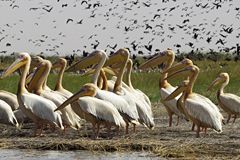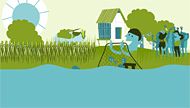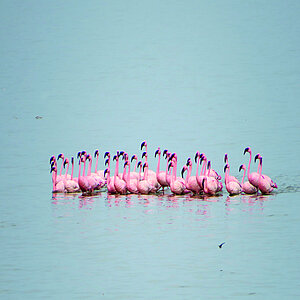Waterbirds and climate change adaptation

Federal Ministry for the Environment promotes protection of migratory waterbirds and their habitats.
The German Federal Ministry for the Environment, Nature Conservation, Building and Nuclear Safety (BMUB) is providing over EUR 3 million as part of the International Climate Initiative (IKI) to help protect the habitats of migratory waterbirds on the Eurasian-African migration route in Mali and Ethiopia.
Every year, millions of migratory waterbirds leave their breeding grounds to make their way on the Eurasian-African migration path towards warmer regions that offer adequate food in the winter. Upon reaching their destination they also make use of protected areas for overwintering, such as the Inner Niger Delta in Mali - the second largest wetland in Africa. Ethiopia also plays a key role on the migratory route. But increasingly, human activities and global warming are jeopardising the habitats and migratory routes of the waterbirds; for example, wetland habitats are in danger of drying up and being lost.
The aim of the project implemented by the conservation organisation Wetlands International is to promote the development of a network of managed and protected areas. In this way, the project supports the resolutions under the Agreement on the Conservation of African-Eurasian Migratory Waterbirds (AEWA) and the goals of the Convention on Biological Diversity (CBD) and the United Nations Framework Convention on Climate Change (UNFCCC). AEWA, which is administered by the United Nations Environment Programme (UNEP), aims to protect migratory waterbird habitats and species, such as cranes, storks, flamingos, geese, ducks, swans and waders, through a transboundary system covering all the member states. The Agreement comprises the western parts of Asia, all of Europe and Africa, and some Arctic islands in north-eastern Canada.
Within the framework of the four-year project, an initial analysis will be conducted to determine the dangers facing waterbird habitats in need of protection. This will also allow particularly 'critical areas’ to be identified for climate change adaptation measures. Subsequently, the project will provide support to the responsible government authorities in Mali and Ethiopia in adopting measures to protect waterbirds from climate change. The local population in both countries will also be involved in the processes for restoring important habitats of waterbirds and for the sustainable use of protected areas.
The link has been copied to the clipboard
Contact
IKI Office
Zukunft – Umwelt – Gesellschaft (ZUG) gGmbH
Stresemannstraße 69-71
10963 Berlin







